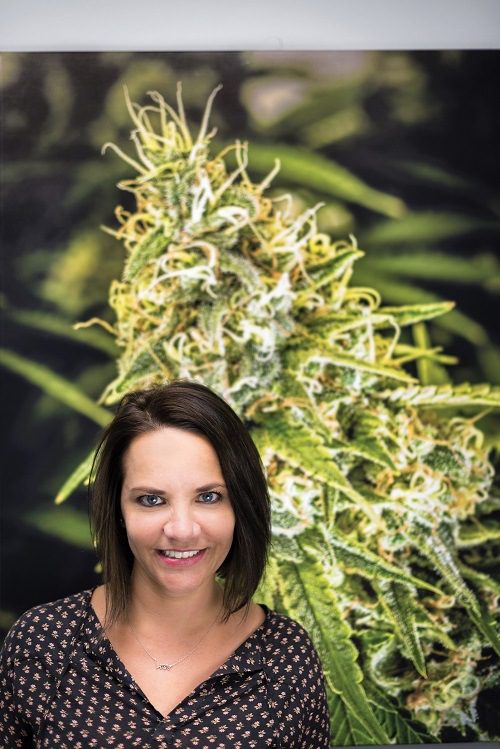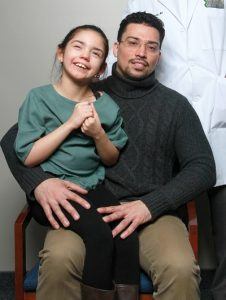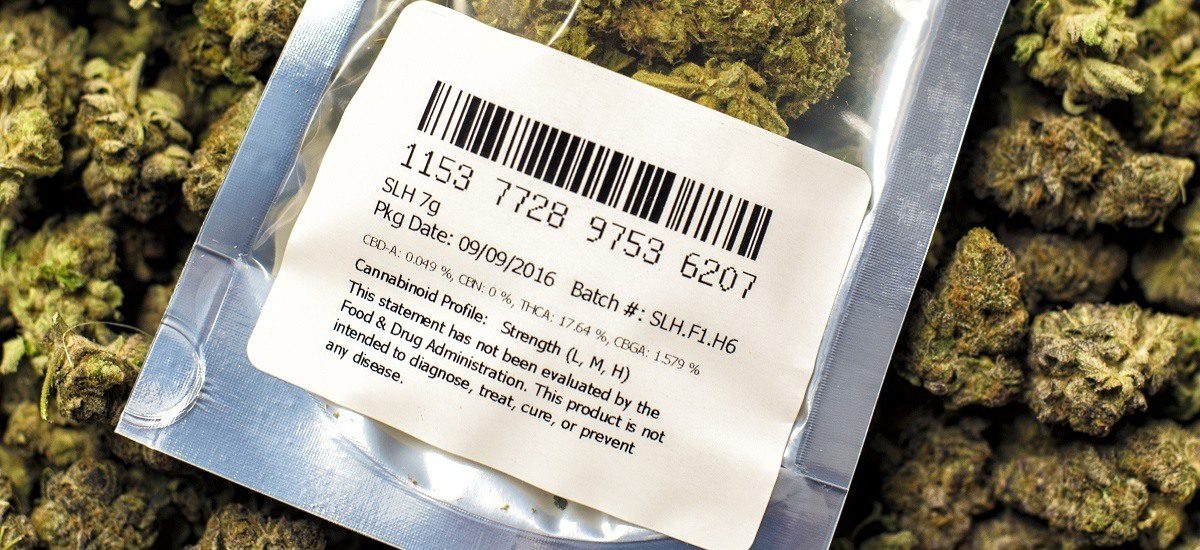Five years after New Jersey legalized medical marijuana, South Jersey got its first dispensary. Roadblocks still exist, like unclear laws, complicated processes and, of course, society’s stigma. But for patients whose lives have been transformed by the new access, it’s a day they’ve been waiting for.
Tucked back on an industrial corner in Bellmawr, South Jersey’s first medical marijuana dispensary probably doesn’t fit what you would envision when you try to picture a place to get marijuana. A former T-shirt factory, the unembellished concrete building is painted a crisp white with blue accents. A small, corporate sign adorns the wall next to the tinted-glass doorway, betraying no hints of the activity inside.
Yet once you are buzzed into Compassionate Sciences Alternative Treatment Center (CS), the unmistakably musky odor of pot is in the air.
Security is tight. Patients must show cards linked to New Jersey’s medical marijuana registry and a photo ID to gain entry into the dispensary, which is a cross between a doctor’s office and an upscale head shop.
For South Jersey residents enrolled into the state’s Marijuana Medical Program (MMP), the arrival of Compassionate Sciences has been a long time coming. Five years after New Jersey’s Compassionate Marijuana Act was enacted in 2010, CS opened for business in September 2015, becoming only the fourth alternative treatment center in the state. Until that time, the closest center was in Egg Harbor Township.

Gretchen McCarthy, director of dispensary operations at Compassionate Sciences Treatment Center
For years, patients and advocates have criticized New Jersey’s State Department of Health for its slow pace approving dispensaries, saying it had resulted in limited access and an inadequate variety of medications for patients. In addition, they charged, the lack of competition led to the highest-priced product ($489 per ounce in 2014) among Washington, D.C. and the 23 states that have legalized marijuana either outright or for medicinal purposes.
The arrival of CS, followed closely by the opening of Breakwater Treatment and Wellness Center in Cranbury less than a month later, has been a boon for South Jersey patients. From the get-go, both CS and Breakwater have offered expanded hours of operation, discounted prices, a greater variety of medicine and a more customer-friendly vibe. CS leads the pack with the most strains – 45 of them, with some 15 available at a given time – and is far ahead in its quest to manufacture edible and topical products. Currently, only cannabis flowers and buds can be sold in New Jersey.
“Compassionate Sciences came in with a whole different approach, and it really made the other dispensaries step up,” says Ricardo Rivera, a marijuana reform advocate whose 9-year-old daughter Tatyana “Tuffy” has made remarkable strides using marijuana to treat her seizure condition.
Tuffy, who was approved for her medical marijuana card in 2014, was previously registered with two other centers before CS opened. Even before Rivera had a chance to switch to the closer center, CS Director of Dispensary Operations Gretchen McCarthy reached out to let him know the center offers a 40 percent discount on medication for children.
“She said she had seen a video of my daughter seizing and how much suffering she went through,” says Rivera, a Camden County resident. “It really touched us.”
In the early days, when the first three dispensaries were the only games in town, the experience of purchasing marijuana was far different, recalls Moorestown resident Michael Brennan, 58. Permanently disabled, Brennan could not make the long drive to the dispensaries, so he had to rely on relatives to drive him monthly. The first center where he was registered sold him marijuana that was not “cured” or dried, so he couldn’t use it right away. He also found the clerks were ill-prepared to help customers.
“I needed something for when the pain gets unbearable and asked the saleswoman to explain the choices,” says Brennan, who switched to CS. “The poor girl just looked at me and said, ‘This one will get you high. This one won’t get you high, and this one is in the middle. The response just floored me. I really had to think about what I was doing there.”
As of July, 10 months after CS opened shop, its customer base had grown significantly, capturing nearly 1,500 of some 8,500 approved patients statewide, according to the New Jersey State Department of Health (DOH). Some 50 percent of CS customer’s are considered low-income.
Medical marijuana is available only to New Jersey residents undergoing treatment for one of 10 ailments approved by the state, which include terminal illnesses, glaucoma, intractable skeletal spasticity and seizure disorders, among others. Recently, the state DOH has signaled some movement in expanding qualifying conditions. In August, a newly appointed medical review panel accepted public suggestions for medical conditions to consider adding. Last month, Gov. Chris Christie signed a law adding post-traumatic stress disorder as an approved condition.
Like a general pharmacy, the dispensary’s primary mission is to sell medicine: Medicinal marijuana to be exact. But unlike typical pharmacies, which stock much more than prescription drugs, CS strictly sticks to cannabis and products used to inhale or otherwise ingest the medicine. Recently, CS received approval to manufacture and sell cannibis-infused oils and lotions.

Ricardo Rivera with 9-year-old daughter Tatyana
The building also houses an impressive greenhouse operation in which climate-controlled rooms are filled with plants in various stages of maturation. All processes – from growing to harvest to packaging to sales – are done in-house, with a constant cycle of cannabis crop ready for harvest approximately every four weeks.
“It’s truly a seed-to-sale system,” explains McCarthy, who ran a dispensary in Maine before moving to South Jersey in 2015 to open CS.
While the cultivation, harvesting of plants and sales operations is the bulk of the business, McCarthy says one of her primary missions is to spread knowledge and dispel myths about marijuana. She’s been aggressively reaching out to area clinicians, law enforcement and community groups, including support groups for epilepsy patients and veterans interested in learning about the application of marijuana to treat PTSD.
CS also regularly organizes classes for patients that focus on helping them get the most therapeutic benefit out of their medicine. The popular “Introduction to Cooking” (with cannabis) features hands-on demonstrations of the Magical Butter Machine, a botanical extractor, and features tried-and-tested recipes. Another class provides an overview of how the body receives the chemical compounds known as cannabinoids in marijuana.
While some doctors have whole-heartedly embraced the use of medicinal marijuana – and recent studies show patients using it for conditions such as nausea and pain fill significantly fewer prescriptions for more addictive medications like Oxycodone and antidepressants – the medical community also has a huge learning curve, McCarthy says. Typically doctors prescribing medical marijuana defer to the CS team to recommend the strains that will be effective and for instructions on using cannabis, she says.
Marijuana’s continued federal classification as a Schedule 1 drug remains a significant roadblock to its use. The classification lumps marijuana in with heroin in the category reserved for drugs that have “no currently accepted medical use,” therefore severely limiting research that doctors rely on for dosage information.
“We’re seeing that we know more than the physicians at this point, and that’s why we’re trying to build relationships with area doctors,” McCarthy says.
CS is also making in-roads with the law enforcement community. “There have been times when people have been pulled over and given a hard time for carrying our products,” McCarthy notes. “We’re trying to get in front of that. We’ve had the whole Bellmawr Police Department in for tours and have been invited to talk to state troopers.”
To help with the education, CS’s full-time security guard, Mike Kappre, plays a significant role. A retired police officer, his career has come full circle, from arresting people for possession of marijuana to educating law enforcement agents about its medicinal benefits.
“When I tell you I learned a lot – we wouldn’t have time to talk about what I learned,” says Kappre, a retired U.S. Marine. “It’s gone from one extreme to the other. I’m seeing what a difference it makes in people’s lives. But that’s not to say I’m for the street peddlers. I’m not. That’s not medicine; that’s junk.”
Even among those who benefit from the medicine, the stigma has been hard to overcome. Cherry Hill resident Allison Damato, 29, admits she was hesitant to use marijuana to treat chronic pains and other ailments that were the result of a slip and fall accident in 2009. As a recovering heroin addict who had gotten clean before her disabling accident, she didn’t want to go down that path again.
“It was hard for me to accept marijuana as a medication,” says Damato, who recently graduated from Drexel University with a degree in behavioral health counseling. “I always heard it was a gateway drug.”
She’s glad she opened the door, noting that marijuana use significantly reduces pain that previously defied conventional treatments and has helped her adopt a healthier lifestyle. Influenced by CS classes, she now eats natural and organic foods and has been able to start exercising. Damato recently lost 60 pounds on her 5’1” frame.
Still, she is like many patients who struggle to afford the medicine, which is not covered by health insurance. Even after taking advantage of discounts and monthly price breaks, her medication costs more than $300 per month. It is also the only medicine taxed in the state.
Through CS’s cooking classes, Damato has learned to make foods that help stretch the supply. Her favorite is Fire Cracker, a recipe for graham crackers and natural peanut butter with ground marijuana baked on the top.
“It took practice to get the right dosage, but all it takes is one bite in the morning,” Damato says, “and I can go about my day.”















This is a great article. I am especially interested about Medical Marijuana. Thank you.